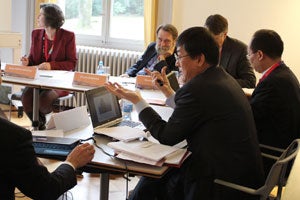More than 100 legal scholars gathered in Geneva, Switzerland for the Geneva-Harvard-Renmin-Sydney Law Faculty Conference, a three-day event that explored the history and evolution of property laws around the world.
The conference, which took place Jan. 14-16, brought together faculty from Harvard Law School, the University of Geneva, Renmin Law School (China), and Sydney Law School (Australia). HLS faculty and students have been actively involved with these institutions for many years. The conference was principally organized by the University of Geneva Faculty of Law and the Confucius Institute, and was sponsored by the Latsis Foundation and Hanban, an organization dedicated to Chinese cultural teaching worldwide.
In her opening remarks, Christine Chappuis, dean of Geneva’s Law Faculty, noted that property law “is generally regarded as a set of national, rather rigid and mandatory rules. Things are changing though. We are here to investigate exactly how much.”
In workshops and a public conference, panels of speakers from the four law schools considered the interplay between public and private property, the relationship between intellectual property and property, and the protection of private and public property under international law. The Harvard delegation included:
- Charles Donahue, Jr., Paul A. Freund Professor of Law, who spoke on “The Emergence of Property in Land in Twelfth and Thirteenth-Century England: Blurring the Public-Private Distinction”
- Michael Kenneally, JD ’11 and a Ph.D candidate in Philosophy at Harvard, who spoke on “Misappropriation, ‘Quasi-Property,’ and Lockean Ethical Theory”
- Henry E. Smith, Fessenden Professor of Law and Director of the Project on the Foundations of Private Law, who spoke on “Property, Equity and the Rule of Law”
- Thomas W. Merrill, Charles Evans Hughes Professor of Law at Columbia Law School, who spoke on “U.S. Regulatory Takings Law: Less of a Mess Than Commonly Thought?” (Merrill has been a visitor at HLS and has co-authored two books and several articles with Smith.)

“The conference was an excellent opportunity to gain a comparative perspective on the fundamental institution of property,” said Smith.
At a dinner for the participants hosted by University of Geneva President Jean-Dominique Vassalli, artist Wang Fei demonstrated the Chinese art of calligraphy, creating a scroll that captured the work –and the spirit – of this collaborative undertaking. The artist drew the ancient character for “law” next to characters meant to express the concept of something stable and good, as well as the ability to distinguish between right and wrong. Other lines on the scroll captured the idea that legal scholars search everywhere to find the right principles to follow, then work to protect and maintain the public instruments arising from them.
